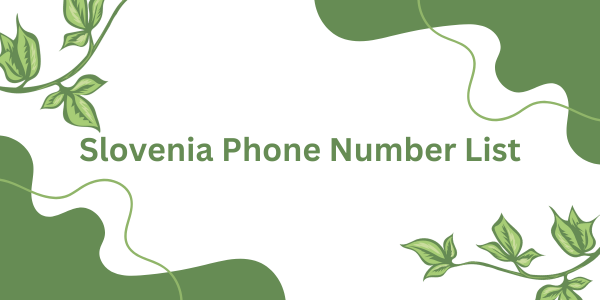|
|
Tourism is a vital sector of Slovenia’s economy, contributing significantly to its GDP, employment, and international reputation. The country’s natural beauty, historical landmarks, and cultural heritage make it an attractive destination for travelers, with diverse offerings ranging from outdoor activities to heritage tourism.
Slovenia’s strategic location, nestled between the Alps, the Adriatic Sea, and Slovenia Phone Number List Central Europe, has cemented its position as a key European destination. The country is renowned for its diverse landscapes, including Lake Bled, the Triglav National Park, the picturesque Soča River valley, and the Adriatic coastline. Slovenia’s capital, Ljubljana, is celebrated for its charming old town, vibrant cafes, and cultural attractions, which further enhance its appeal as a city break destination.
Tourism contributes approximately 6–7% of Slovenia’s GDP and supports over 10% of the workforce, including jobs in hospitality, transportation, recreation, and services. These statistics highlight tourism’s role as a significant driver of economic growth. Slovenia has experienced a steady increase in tourist arrivals, with both international and domestic visitors enjoying its diverse offerings. The industry has proven resilient, recovering steadily even after challenges such as the COVID-19 pandemic.
The government has actively promoted Slovenia as a sustainable and green destination, aligning with its environmental goals and natural assets. The country was awarded the European Commission’s EDEN Award for sustainable tourism, reflecting its commitment to responsible and eco-friendly travel. Slovenia is also implementing infrastructure development to improve accessibility and tourism services, including upgrades to transport systems, accommodations, and recreational areas.

Cultural tourism and eco-tourism are key growth areas. Slovenia’s UNESCO World Heritage sites, medieval castles, and festivals attract culture enthusiasts, while its national parks, hiking trails, and cycling routes appeal to eco-conscious travelers and adventure seekers. Additionally, Slovenia has developed a strong health and wellness tourism sector, with natural thermal spas like those in Rogaška Slatina and other wellness resorts offering relaxation and therapeutic experiences.
The Slovenian Tourist Board (STB) works closely with local communities and the private sector to promote sustainable tourism, focusing on regional diversity and inclusivity. Investments in marketing, infrastructure, and preservation of natural resources have strengthened Slovenia’s position in the global tourism market.
In conclusion, tourism is essential to Slovenia’s economy, providing employment opportunities, contributing to GDP, and supporting local communities. Its combination of natural beauty, cultural heritage, and commitment to sustainability positions it as a thriving, forward-thinking destination with immense economic potential.
|
|